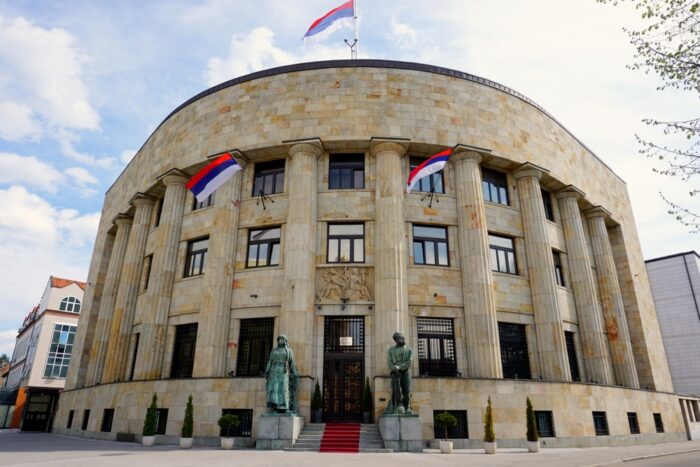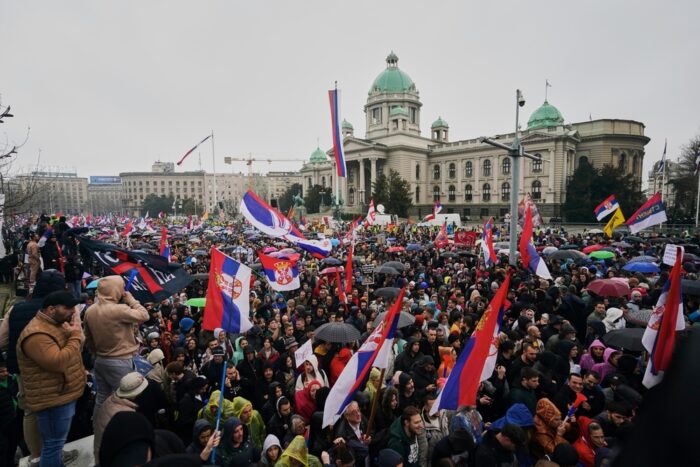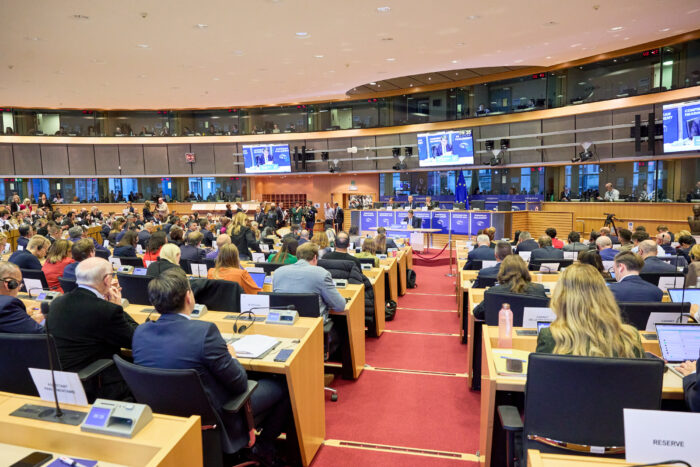Find all related Progressive Post
Progressive Post

The enlargement of the European Union in 2004 was the result of a longer historical process rather than just a decision. During the 1990s, the European area underwent rapid development. Its basic component was the disintegration of the Soviet Union and the collapse of its empire under the pressure of the Central European revolutions. This power vacuum had several consequences, the most important of which were the liberation of the Central European states and the Yugoslav war. Another equally important moment was the opening of the way to German unification.
The European Union faced several challenges. The first was the integration of a united Germany, which was essentially aimed at deepening the European integration. The same goes for the decision to create a common currency. The second challenge was Central Europe’s stability, which was underlined by the war in Yugoslavia, which clearly showed how great the risks were. The Union had to decide between deepening, taking advantage of the integrating power of the common currency and the reunification of Germany, and an enlargement aimed at stabilising the Central European area.
But the Central European countries’ will to join the EU and their resolve to make the necessary political and civilisational effort to do so was equally important. They saw the European Union as their natural civilisational space and, of course, as a source of future prosperity. At the same time, they saw it as a safe haven that would permanently remove them from the Soviet sphere of interest, and, subsequentially, form the Russian one. The Union finally decided to enlarge, which brought great benefits to the whole of Central Europe and to the Union itself in many ways.
First, it strengthened the EU, due to the integration capacity of the Central European countries and it stabilised the Central European area at the same time. The experience of the war in Yugoslavia showed very clearly that it is very difficult to predict how conflicts can escalate that have often been dormant for a long time.
For the Central European countries, the accession process itself was of particular importance, as the European perspective provided an anchor for development. The political consensus about joining the European Union within the countries made it much easier to control the radical transformation from a communist system to social market economy. What the situation would have been like without the European Union is difficult to predict, but developments in the Russian Federation may provide an illustration.
In a way, it is paradoxical that this process, despite its complexity and some very harsh consequences, has gone so smoothly that it has faded into the collective memory as a part of a transition period called ‘the wild ’90s’. One of the reasons was that with the accession process, these wild 90s have come to an end. And that they were followed by a phase of a stable democratic market system. The accession of Central Europe to the EU has, of course, impacted the Union itself, weakening its capacity for a further deepening of the integration. This was reflected, among other things, in the referendums in France and the Netherlands, thwarting the adoption of the Constitutional Treaty. Social differences and economic disparities have become much more pronounced and, unfortunately, the Union has not yet found the appropriate means to resolve them. The countries that joined the EU brought their own distinctive political traditions to the Union. This means not only being aware of the different traditions of political democracy and parliamentarism (and recognising their often relative and real weaknesses), but also considering the different historical experiences of this part of Europe when negotiating.
The 2004 enlargement has taught us several lessons. Enlargements are never simply an expression of the will of the Union itself. In a way, all enlargements were imposed by history. Each enlargement affects the functioning and political orientation of the Union as a whole. Each enlargement is a long-term process, with a very long pre-accession phase, and also subsequent phases, which can never be considered in terms of years, but rather decades.
Each enlargement requires more or less radical changes in the institutions, legislation or work practices on both sides, but – thanks to this – the future will not be more different. The Union is an extraordinary political innovation, thanks to the creation of the institutions of shared sovereignty, which was a response to the inadequacy and weakness of intergovernmental coordination in dealing with the peaceful stabilisation of Europe. It is precisely the system of shared sovereignty that forms the basis of Europe’s political identity.
There is no other grouping of countries that is governed in a similar way. If we fail to develop this system in the future, we will lose our identity, and Europe will be in danger. This would not only destabilise the European continent, but also mean the return of great power politics and the concert of the great powers, which we considered to be outdated in our part of the world. This would not only be to the detriment of the European states but, as a process of global significance, would probably threaten human civilisation as a whole.
The system of shared sovereignty is precisely the instrument that could be applied to the most difficult issues worldwide. If it were to be weakened or disappear, we would probably not find a suitable replacement in the time available to us.
The challenges we face today are similar in complexity to those of peacekeeping after the Second World War. They are, for example, a response to reaching the planet’s ecological limits or the war in Ukraine. We will not succeed in the long term without changing, at least in part, the architecture of the European Union. To stabilise the European area in the long term and use its enormous social and civilisational potential, it is necessary to enlarge the Union, and that means institutional change.
Photo credits: EuropeanUnion2024
| Cookie | Duration | Description |
|---|---|---|
| cookielawinfo-checkbox-advertisement | 1 year | Set by the GDPR Cookie Consent plugin, this cookie is used to record the user consent for the cookies in the "Advertisement" category . |
| cookielawinfo-checkbox-analytics | 11 months | This cookie is set by GDPR Cookie Consent plugin. The cookie is used to store the user consent for the cookies in the category "Analytics". |
| cookielawinfo-checkbox-functional | 11 months | The cookie is set by GDPR cookie consent to record the user consent for the cookies in the category "Functional". |
| cookielawinfo-checkbox-necessary | 11 months | This cookie is set by GDPR Cookie Consent plugin. The cookies is used to store the user consent for the cookies in the category "Necessary". |
| cookielawinfo-checkbox-others | 11 months | This cookie is set by GDPR Cookie Consent plugin. The cookie is used to store the user consent for the cookies in the category "Other. |
| cookielawinfo-checkbox-performance | 11 months | This cookie is set by GDPR Cookie Consent plugin. The cookie is used to store the user consent for the cookies in the category "Performance". |
| csrftoken | past | This cookie is associated with Django web development platform for python. Used to help protect the website against Cross-Site Request Forgery attacks |
| JSESSIONID | session | The JSESSIONID cookie is used by New Relic to store a session identifier so that New Relic can monitor session counts for an application. |
| viewed_cookie_policy | 11 months | The cookie is set by the GDPR Cookie Consent plugin and is used to store whether or not user has consented to the use of cookies. It does not store any personal data. |
| Cookie | Duration | Description |
|---|---|---|
| __cf_bm | 30 minutes | This cookie, set by Cloudflare, is used to support Cloudflare Bot Management. |
| S | 1 hour | Used by Yahoo to provide ads, content or analytics. |
| sp_landing | 1 day | The sp_landing is set by Spotify to implement audio content from Spotify on the website and also registers information on user interaction related to the audio content. |
| sp_t | 1 year | The sp_t cookie is set by Spotify to implement audio content from Spotify on the website and also registers information on user interaction related to the audio content. |
| Cookie | Duration | Description |
|---|---|---|
| CONSENT | 2 years | YouTube sets this cookie via embedded youtube-videos and registers anonymous statistical data. |
| iutk | session | This cookie is used by Issuu analytic system to gather information regarding visitor activity on Issuu products. |
| s_vi | 2 years | An Adobe Analytics cookie that uses a unique visitor ID time/date stamp to identify a unique vistor to the website. |
| Cookie | Duration | Description |
|---|---|---|
| NID | 6 months | NID cookie, set by Google, is used for advertising purposes; to limit the number of times the user sees an ad, to mute unwanted ads, and to measure the effectiveness of ads. |
| VISITOR_INFO1_LIVE | 5 months 27 days | A cookie set by YouTube to measure bandwidth that determines whether the user gets the new or old player interface. |
| YSC | session | YSC cookie is set by Youtube and is used to track the views of embedded videos on Youtube pages. |
| yt-remote-connected-devices | never | YouTube sets this cookie to store the video preferences of the user using embedded YouTube video. |
| yt-remote-device-id | never | YouTube sets this cookie to store the video preferences of the user using embedded YouTube video. |
| yt.innertube::nextId | never | This cookie, set by YouTube, registers a unique ID to store data on what videos from YouTube the user has seen. |
| yt.innertube::requests | never | This cookie, set by YouTube, registers a unique ID to store data on what videos from YouTube the user has seen. |
| Cookie | Duration | Description |
|---|---|---|
| COMPASS | 1 hour | No description |
| ed3e2e5e5460c5b72cba896c22a5ff98 | session | No description available. |
| loglevel | never | No description available. |


